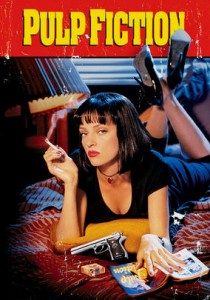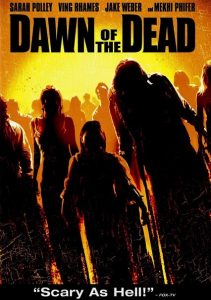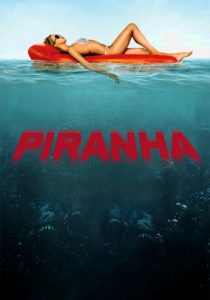Pulp Fiction-1994
Director Quentin Tarantino
Starring John Travolta, Samuel L. Jackson, Uma Thurman
Top 250 Films #23
Scott’s Review #242
Reviewed May 12, 2015
Grade: A
Pulp Fiction (1994) is one of the most influential films of the 1990s and single-handedly kicked the film industry in the ass. It led an entire generation of filmmakers, who were starved and determined to make more creative work after the largely dull decade of the 1980s.
The success of the film, both creatively and critically, helped ensure that edgier and more meaningful artistic expression would continue to occur.
The leader of the charge, of course, was director Quentin Tarantino.
With Pulp Fiction, a black comedy crime film, Tarantino mixes violence, witty dialogue, and a 1970’s cartoonish feel to achieve a filmmaking masterpiece.
The plot is non-linear, and the story contains three main focuses that intersect —a new style of filmmaking that has become commonplace in modern cinema, but at the time was a novel adventure.
Set in Los Angeles, Samuel L. Jackson and John Travolta portray hitmen named Jules and Vincent, who work for a powerful gangster, Marsellus Wallace, played by Ving Rhames. We get to know them as they interrogate four college-aged youths who double-crossed Marsellus, all the while discussing fast-food hamburgers and adventures in Europe.
On another front, Butch (Bruce Willis) is hired by Marsellus to lose a fight to another boxer. Later, Marcellus instructs Vincent to take his wife Mia (Uma Thurmon), a former unsuccessful television actress, out for dinner and a night on the town.
Finally, we meet Pumpkin and Honey Bunny (Tim Roth and Amanda Plumber), two small-town robbers plotting a heist at a local diner. As the film develops these plots relate to each other in unique ways.
The film is quite stylistic, resembling a 1970s film production in the way it looks, and the use of 1970s style sets- the diner, in particular, looks very of that time, and an automobile where a death occurs, is a 1970s, Chevy Nova.
The film, however, is set in present times.
The dialogue throughout Pulp Fiction is immensely impressive to me. Long dialogues occur between characters, usually sitting over a meal, discussing the meaning of life, religion, fast-food burgers, and other wonderfully real conversations.
I love the many food references- from Butch’s girlfriend salivating over an impending meal of blueberry pancakes to the French version of the Big Mac being discussed, to the price of a shake, these make the conversations between the characters rich and unique and oh so creative.
My favorite sequence is the one between Vincent and Mia, mostly taking place at a trendy 1950s-themed diner named Jack Rabbit Slim’s, where the staff dresses up in costume impersonating their favorite stars of the day, such as Marilyn Monroe.
After winning a dance contest (and a possible homage to Saturday Night Fever) the two go back to Mia’s place where she accidentally overdoses on heroin thought to be cocaine.
The song “Girl, You’ll Be a Woman Soon” by Neil Diamond, is both integral and haunting to the scene.
An intense and shocking scene of male gay rape is extremely violent and the hillbillies involved could be straight out of Deliverance from 1972 despite being in Los Angeles.
This scene is disturbing yet mesmerizing at the same time, and might I say even comedic in a dark way?
Pulp Fiction is not a mainstream affair and has its share of detractors and plain old non-fans, but for film-goers seeking a fun, entertaining, cleverly delicious work of art, influential to Hollywood and Independent filmmakers alike, Pulp Fiction (1994) is a film to watch over and over again and admire its style and creativity.
Oscar Nominations: 1 win-Best Picture, Best Director-Quentin Tarantino, Best Actor-John Travolta, Best Supporting Actor-Samuel L. Jackson, Best Supporting Actress-Uma Thurman, Best Screenplay Written Directly for the Screen (won), Best Film Editing
Independent Spirit Award Nominations: 4 wins-Best Feature (won), Best Director-Quentin Tarantino (won), Best Male Lead-Samuel L. Jackson (won), Best Supporting Male-Eric Stoltz, Best Screenplay (won)


